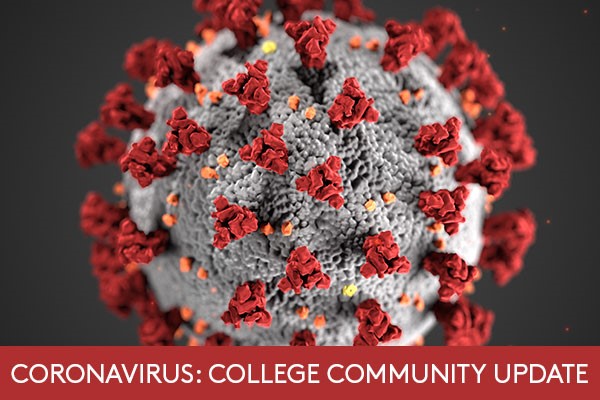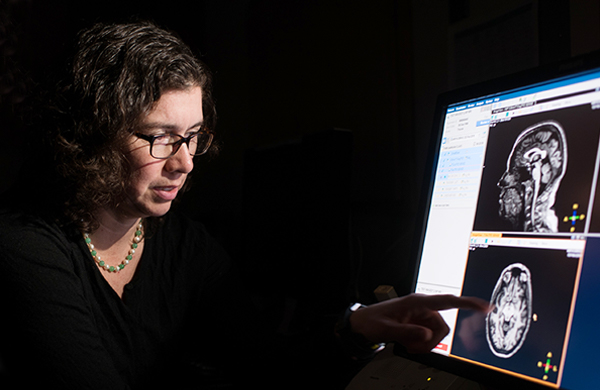April 8, 2020 | Volume II, Issue 7
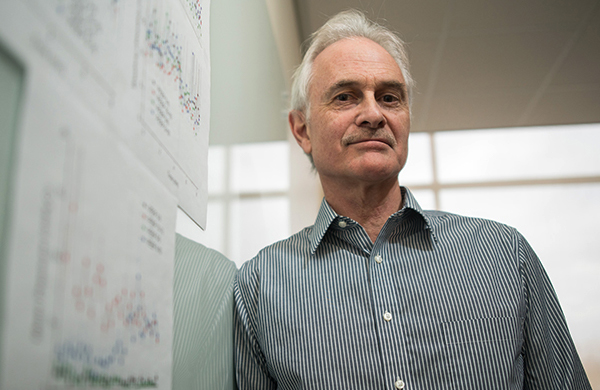
Bates and Vermont Team Invent Emergency Ventilator
Over the past month, a team of University of Vermont scientists, engineers and doctors have developed a new design—and built a working model—for a simple, inexpensive ventilator.
“We think these could be rolled out very quickly and be effective on an emergency basis,” says Professor of Medicine Jason Bates, M.D., Sc.D., who is leading the new effort in response to the burgeoning global coronavirus epidemic—and the huge shortage of ventilators that may be needed to treat people.
Affectionately called the “Vermontilator," preliminary calculations suggest the UVM ventilator “can be produced quickly and in large numbers for a few hundred dollars per unit in parts and materials,” Dr. Bates says.
Unlike other improvised emergency ventilator designs, now being worked on around the world, the UVM team’s approach uses an alternative mode of helping critically ill patients breathe. It’s called “airway pressure release ventilation” or APRV—an approach that could be particularly useful for patients suffering from one of the main complications from COVID-19—acute respiratory distress syndrome. Its design allows the inflation of their lungs using long inspirations of air, which are held inflated at a constant and relatively high pressure, Bates explains. Then “at regular intervals, short expirations are allowed during which the lungs expel carbon dioxide,” he says.
Read more about the “Vermontilator.”
Read more Larner College of Medicine-related COVID-19 stories.
Staying Home, Safe, and Together
Dear Larner Community:
Many of us are adjusting to a life where we almost never go out, and interact with almost nobody in person. Yet thanks to technology, most of us are remarkably connected and much is being accomplished at home. In contrast to those of us
sheltering in place, we must remember and thank those of you on the front lines, caring for those in need during this unimaginable public health crisis.
In my effort to keep us connected, I want to keep know about some of the activities in our College and how we continue to do our part in terms of education, research, clinical care and service to our community. Details from all these areas can be
found on the latest Dean’s Update page on our website here. Please also take a few minutes to read about pandemic-related
work at Larner and UVM on the new Larner COVID-19 Stories page.
The term, “social distancing” is changing to “physical distancing,” with recognition that we must strive to stay socially connected. With that in mind, along with the fact that so much is happening so quickly, we held an online
Town Hall on April 7. I would like to thank everyone across the College who worked to make this event a success — not only my fellow panelists, but also the COMTS team whose work allowed us to “gather” and be heard. It
was a great demonstration of how we can join together socially through technology, even at a time when we must stay physically apart to meet the challenge of stemming the COVID-19 pandemic.
For those who joined us, thank you for your engagement and the questions you provided. For those of you who were unable to view the Town Hall in real time, a recording of the one-hour event is available here. Following up, we plan to hold more of these sessions in the near future to answer questions and maintain our connection, even while we are apart.
Stay well,
Dean, The Robert Larner M.D. College of Medicine
The University of Vermont
Dumas' NIA Study Examines Menopause and Alzheimer's Disease
Do the cognitive changes that sometimes occur at menopause relate to an increased risk for Alzheimer’s disease (AD)? That’s what a newly launched study, co-led by Associate Professor of Psychiatry Julie Dumas, Ph.D., aims to determine.
According to the Alzheimer’s Association, almost two-thirds of Americans with AD are women. While previous research has shown that some, but not all, women experience a change in cognition at menopause, to date, no research has linked these menopausal cognitive changes to risk for late life aging-related diseases including AD.
One of the challenges for determining this link is what Dumas describes as a “long lag time between the hormonal changes at menopause and the clinical manifestations of AD.” Preclinical studies have shown that estrogen — a hormone produced by the ovaries that is made in significantly less quantities following menopause — is necessary for normal functioning of the brain's cholinergic system, which is responsible for cognitive function. When estrogen is withdrawn, it can lead to a dysfunction in this system.
With the support of more than $7 million in funding from the National Institute on Aging, Dumas, her co-principle investigator Paul Newhouse, M.D., of Vanderbilt University Medical Center, and colleagues will examine biological, brain and memory changes in normal postmenopausal women to determine whether they may be connected to abnormal aging patterns later in life.

#ThanksHealthHeroes: Gratitude for Front Line Workers
The University of Vermont Health Network recently launched the “Gratitude Project," an initiative to gather and post messages and photos from the community, thanking healthcare workers for their tireless and selfless work on the front line of the novel coronavirus (COVID-19) pandemic.
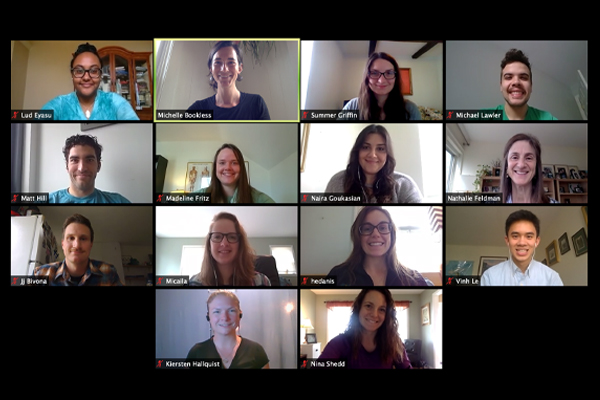
College Establishes COVID-19 Volunteer Task Force
Over the past few weeks, Larner College of Medicine students have sought out and initiated impactful volunteer projects to help address a growing variety of needs presented by the novel coronavirus pandemic. Seeing the need for a centralized model to coordinate these various efforts, Christa Zehle, M.D., senior associate dean for medical education, and Nathalie Feldman, M.D., director of learning environment, convened the LCOM Cares Service Corps – COVID-19 Task Force.
A group comprised of medical students, graduate students, faculty, and staff, the task force meets three times weekly to discuss ongoing efforts, vet new ones, and discuss the promotion of these efforts both externally and within the Larner community. On April 3, Nina Shedd, task force member and web manager for the College, launched the Medical Student COVID-19 Information Portal. The page will serve as a clearinghouse for COVID-19 updates from the College, the University, the UVM Health Network, and Nuvance Health; frequently asked questions; student curriculum resources; and volunteer opportunities.
To complement the site, Alison Howe, M.S., director of evaluation and research for the Teaching Academy and medical student Hillary Danis ’21, developed and implemented a survey of all current medical students to assess interest, skill set, and prior professional healthcare experience, in an ongoing effort to support the UVM Medical Center and the College’s clinical affiliates should a patient care surge arise.
Stay tuned for a mini-series, titled “UVMLarnerMed COVID-19 Volunteer Stories,” in which we'll highlight the many ways in which students, faculty, and staff are joining the COVID-19 fight.
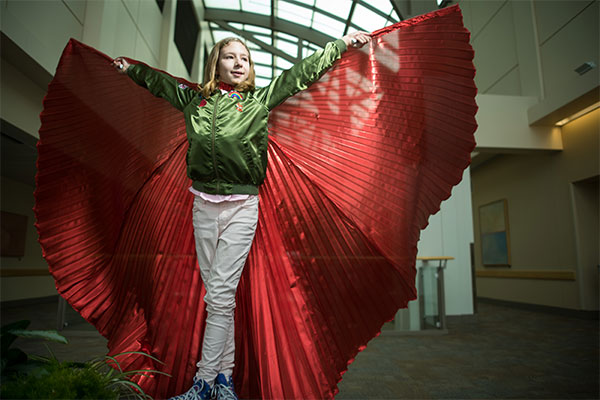
An uplifting read during challenging times: 2019 UVM Medical Center Philanthropy Highlights
Enjoy stories about some of the extraordinary people in our academic medical community, the impact of our collective work on the people we serve, and the wondrous power of generosity. Read the report.
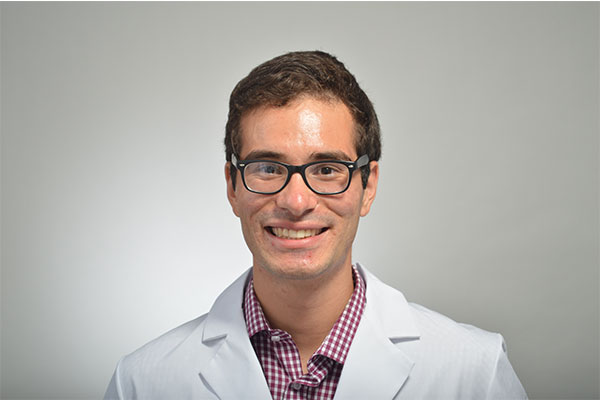
We All Have A Responsibility: Responding to COVID:19
Medical student Richard Brach '22 had been prepared to begin his clerkships when the novel coronavirus struck Vermont. He has shifted gears and is now deeply involved in community outreach while continuing online courses. “While I was initially disappointed about the postponement of my first clinical rotation, I consider myself incredibly fortunate to be in a position where I can continue my education online while also contributing to some of the ongoing efforts in the community,” he says.
Read more in his post for the UVM Larner College of Medicine blog.
Accolades & Appointments

Dominique Lessard, a Ph.D. student in the Cellular, Molecular and Biomedical Sciences (CMB) program, successfully defended her thesis, titled “Novel Pausing Behavior of the Kinesin-3 Family Member KIF1A is Regulated by Tau,” on March 9. Ms. Lessard has been working with her mentor Christopher Berger, Ph.D.,professor of molecular physiology and biophysics and Associate Dean of Graduate Education and Postdoctoral Training.
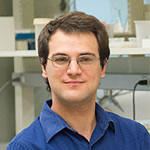
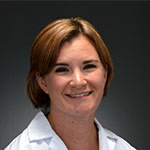

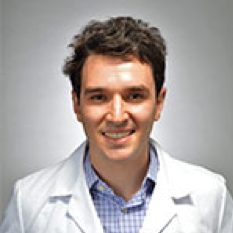
CITATION HIGHLIGHTS
Ikonomou L, Weiss DJ. Turning the Tide on Unproven Cell-Based Interventions. Chest. 2020 Apr;157(4):774-775. doi: 10.1016/j.chest.2019.10.035. PubMed PMID:32252930.
Nivarthi UK, Tu HA, Delacruz MJ, Swanstrom J, Patel B, Durbin AP, Whitehead SS, Pierce KK, Kirkpatrick BD, Baric RS, Nguyen N, Emerling DE, de Silva AM, Diehl SA. Corrigendum to ''Longitudinal analysis of acute and convalescent B cellresponses in a human primary dengue serotype 2 infection model'' [EBioMedicine 41 (2019) 465-478]. EBioMedicine. 2020 Apr 3;54:102708. doi: 10.1016/j.ebiom.2020.102708. [Epub ahead of print] PubMed PMID: 32251996.
Solomon AJ. Progress towards a diagnostic biomarker for MS: Central vein sign. Mult Scler. 2020 Apr;26(4):394-396. doi: 10.1177/1352458520907910. PubMed PMID:32249717.
Taatjes DJ, Roth J. In focus in HCB. Histochem Cell Biol. 2020 Apr 3. doi:10.1007/s00418-020-01870-0. [Epub ahead of print] PubMed PMID: 32246200.
Leavitt C, Zakai NA, Auer P, Cushman M, Lange EM, Levitan EB, Olson N, Thornton TA, Tracy RP, Wilson JG, Lange LA, Reiner AP, Raffield LM. Interferongamma-induced protein 10 (IP-10) and cardiovascular disease in African Americans. PLoS One. 2020 Apr 2;15(4):e0231013. doi: 10.1371/journal.pone.0231013. eCollection 2020. PubMed PMID: 32240245.
Taatjes DJ, Roth J. In focus in HCB. Histochem Cell Biol. 2020 Mar;153(3):129-133. doi: 10.1007/s00418-020-01852-2. PubMed PMID: 32114634.
Mukhtarova N, Ko NL, Gokina NI, Mandalá M, Osol G. Enhanced Vascular Smooth Muscle Calcium Sensitivity and Loss of Endothelial Vasodilator Influence Contribute to Myogenic Tone Development in Rat Radial Uterine Arteries during Gestation. J Vasc Res. 2020 Feb 27:1-10. doi: 10.1159/000505670. [Epub ahead ofprint] PubMed PMID: 32106116.
Miao T, Little AC, Aronshtam A, Marquis T, Fenn SL, Hristova M, Krementsov DN, Vliet AV, Spees JL, Oldinski RA. Internalized FGF-2-Loaded Nanoparticles Increase Nuclear ERK1/2 Content and Result in Lung Cancer Cell Death. Nanomaterials(Basel). 2020 Mar 27;10(4). pii: E612. doi: 10.3390/nano10040612. PubMed PMID: 32230722.
Winkelman JW, Wipper B, Purks J, Mei L, Schoerning L. Topiramate reduces nocturnal eating in sleep-related eating disorder. Sleep. 2020 Mar 30. pii: zsaa060. doi: 10.1093/sleep/zsaa060. [Epub ahead of print] PubMed PMID: 32227216.
Williams R, Sartorelli K. GAS, PANDA, and MASK: Comment. Anesthesiology. 2020 Mar 26. doi: 10.1097/ALN.0000000000003280. [Epub ahead of print] PubMed PMID:32224726.
Seth S, Zanwar S, Vu L, Kapoor P. Monoclonal Gammopathy of Undetermined Significance: Current Concepts and Future Prospects. Curr Hematol Malig Rep. 2020 Mar 28. doi: 10.1007/s11899-020-00569-2. [Epub ahead of print] Review. PubMed PMID: 32222885.
GRANTS REPORT: UVM SPONSORED PROGRAM ADMINISTRATION
Annual/Monthly Reports for Sponsored Projects
WHAT'S HAPPENING
LCOM Events Calendar | UVM Events Calendar | LCOM Student Activities Calendar
Feedback? Contact Us!
View Archive | Subscribe
Published by the Office of Medical Communications
The Larner College of Medicine
at The University of Vermont
Copyright 2020

